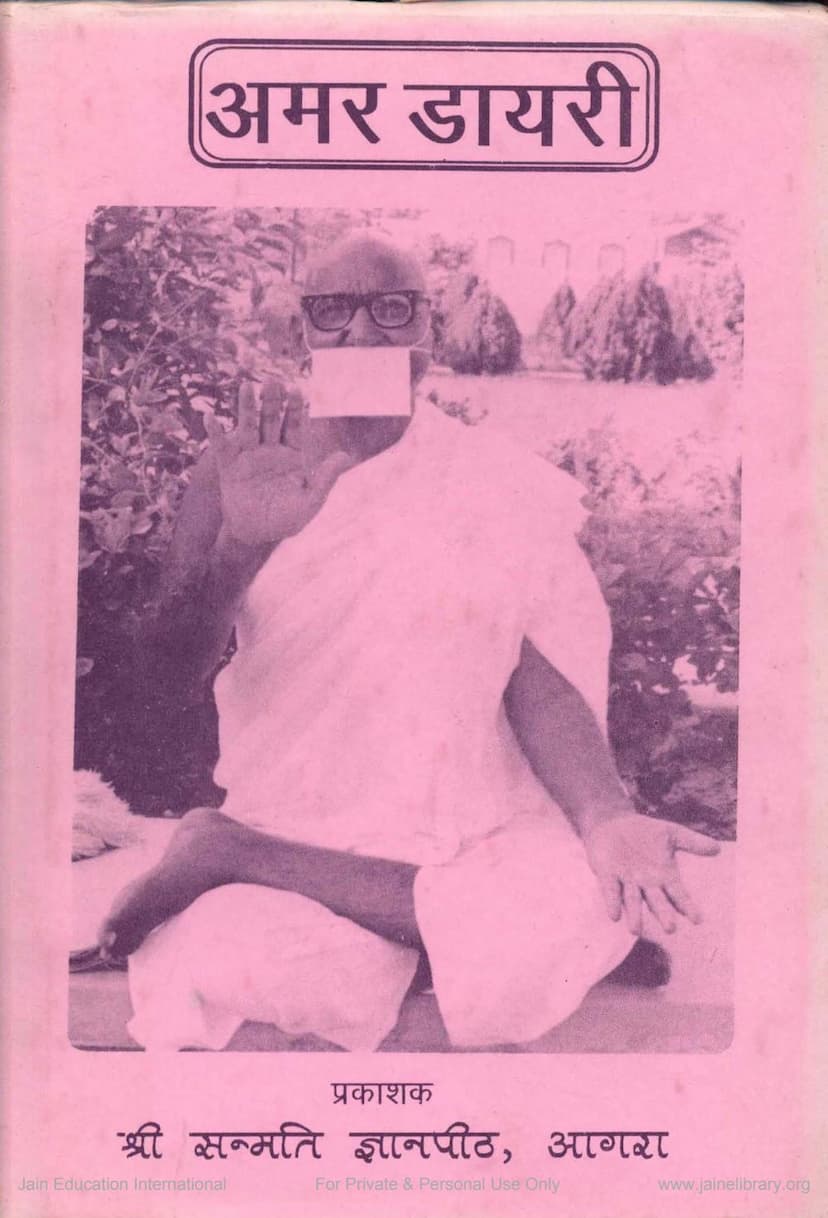Amar Diary
Added to library: September 1, 2025

Summary
"Amar Diary" by Amarmuni, published by Sanmati Gyan Pith Agra, is a collection of philosophical reflections, spiritual insights, and social commentary, presented in a diary-like format. The book aims to provide guidance and inspiration for spiritual seekers and society at large.
Here's a breakdown of the key themes and content:
Core Themes and Teachings:
- Spiritual Practice and Philosophy: The diary delves into various aspects of Jain philosophy and practice, emphasizing the importance of samata (equanimity), ahimsa (non-violence), and anekanta (non-absolutism). It highlights the power of the mind, the pursuit of self-awareness, and the path to liberation.
- Ethical Living: The text stresses the significance of ethical conduct in daily life, covering themes like honesty, compassion, truthfulness, service, and detachment. It offers practical advice on how to navigate life's challenges with integrity.
- Social Commentary: Amarmuni addresses contemporary social issues, critiquing materialism, hypocrisy, and the erosion of traditional values. He advocates for social reform, equality, and the upliftment of humanity.
- Personal Growth and Self-Improvement: The diary serves as a guide for self-reflection and personal development. It encourages readers to cultivate virtues, overcome vices, and strive for spiritual refinement.
- The Nature of Reality: Amarmuni explores profound questions about the self, the universe, and the relationship between the material and spiritual realms. He emphasizes the inner journey and the realization of the true nature of the soul.
Key Concepts and Ideas:
- The Power of the Mind: The book repeatedly underscores the mind's influence on one's reality and destiny, advocating for its control through mindfulness and ethical thinking.
- The Importance of Right Conduct (Achar): While knowledge (Gyan) is valued, the diary places a strong emphasis on right conduct and living by one's principles, asserting that true spirituality is manifested through actions.
- Detachment and Non-Attachment: Amarmuni advises against excessive attachment to worldly possessions, relationships, and even spiritual achievements, promoting a balanced perspective that leads to inner peace.
- The Value of Service: The text highlights the significance of selfless service (seva) to humanity and all living beings as a path to spiritual growth and societal well-being.
- The Universality of Truth: The diary suggests that truth is singular and can be approached from multiple perspectives, advocating for tolerance and understanding among different viewpoints.
- The Significance of "Parva" (Occasions/Junctions): The concept of "Parva" is interpreted not just as festivals but as opportunities for spiritual progress and growth, with each "Parva" marking a step towards a higher state of being.
Style and Tone:
- Reflective and Inspirational: The diary adopts a reflective and often poetic tone, offering gentle yet profound guidance.
- Didactic and Practical: Amarmuni uses simple language and relatable examples to convey complex philosophical ideas and ethical principles in a practical manner.
- Encouraging and Hopeful: Despite addressing societal ills and individual struggles, the overall tone is optimistic, encouraging readers to embrace their spiritual potential and work towards a better future.
Overall Message:
"Amar Diary" is a spiritual and philosophical compendium that guides readers towards a life of ethical conduct, inner peace, and self-realization. It advocates for a harmonious integration of spiritual knowledge and practical living, urging individuals to contribute positively to society and the world. The book serves as a constant reminder of the Jain principles of non-violence, equanimity, and the pursuit of truth, making spiritual wisdom accessible and relevant to everyday life.